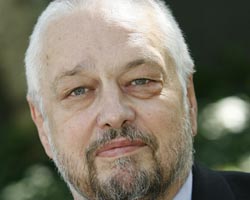Obama on Arab TV: Refreshing or risky?
| Some heralded the move as progressive and refreshing; others feared backlash.
On Jan. 27, President Barack Obama granted his first television interview from the White House and his first interview with foreign news media to Al Arabiya, an Arabic language satellite television station. Based in Dubai Media City, Dubai in the United Arab Emirates, the station started in 2003 as a more moderate alternative to the well-known Al Jazeera. It has close ties to the Saudi royal family. Veteran journalist Christopher Harper believes that President Obama’s interview with the network might have been premature if it occurred without the |
 Photo by Joseph V. Labolito/Temple University
Harper
|
|
benefit of a thorough understanding of news media in the Middle East. Harper, a professor at Temple University’s School of Communications and Theater, also believes the interview was potentially risky as it might have been dangerously misperceived. “The Middle East has been a significant trouble spot for years, if not centuries,” said Harper, who covered the region for more than a decade for Newsweek and ABC News while based in Beirut, Cairo and Rome. “President Obama appearing on Al Arabiya might have been misperceived as a tilt toward Arab countries and against Israel. Those are the tea leaves that you work with in the Middle East. It’s an environment where you need to consider all of the possible reactions to each of your actions.” Most likely, the Obama administration’s intention was to deal more directly with the citizenry and show a greater understanding of the ongoing issues and concerns, Harper explained. “Unfortunately, extremists couldn’t care less about that — and Israelis could be highly critical, particularly at a time when relations between countries in the Middle East are very bad and Israel is going into an election,” he said. “Instead, the interview showed that the administration might not fully understand the ‘streets of the Middle East.’” Any president must be open to talking with all media throughout the world, Harper said, but at the same time he must be cognizant that the structure of those media can be significantly different than in the United States. The journalistic ideals of objectivity, accuracy and balance in the news are primarily American ideals. Some countries, such as Egypt, Syria, Saudi Arabia and other countries throughout the world, have government-controlled media. “Many European journalists will take a set of facts and make a personal political analysis of those facts,” said Harper. “In Italy, for instance, politicians will favor certain reporters because they have a predetermined political bent.” Ironically, Harper finds that it’s sometimes much easier to understand where non-American media are coming from because of this inherent slant or bias. “I don’t have to figure out the agenda like I do with the American media,” he said. “Despite our beliefs in the values of fairness, accuracy and balance, we in the U.S. media have great difficulty accepting that we too can be biased.” |
|